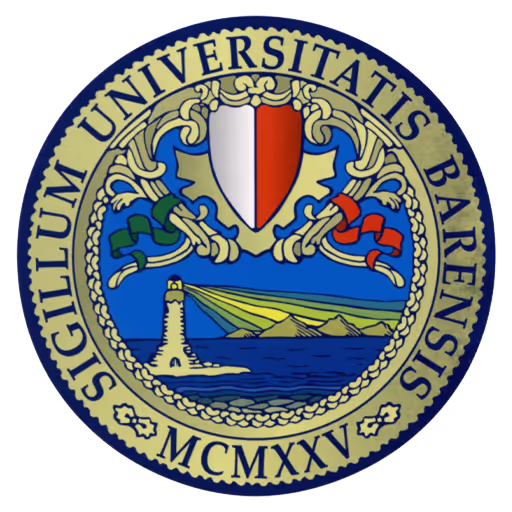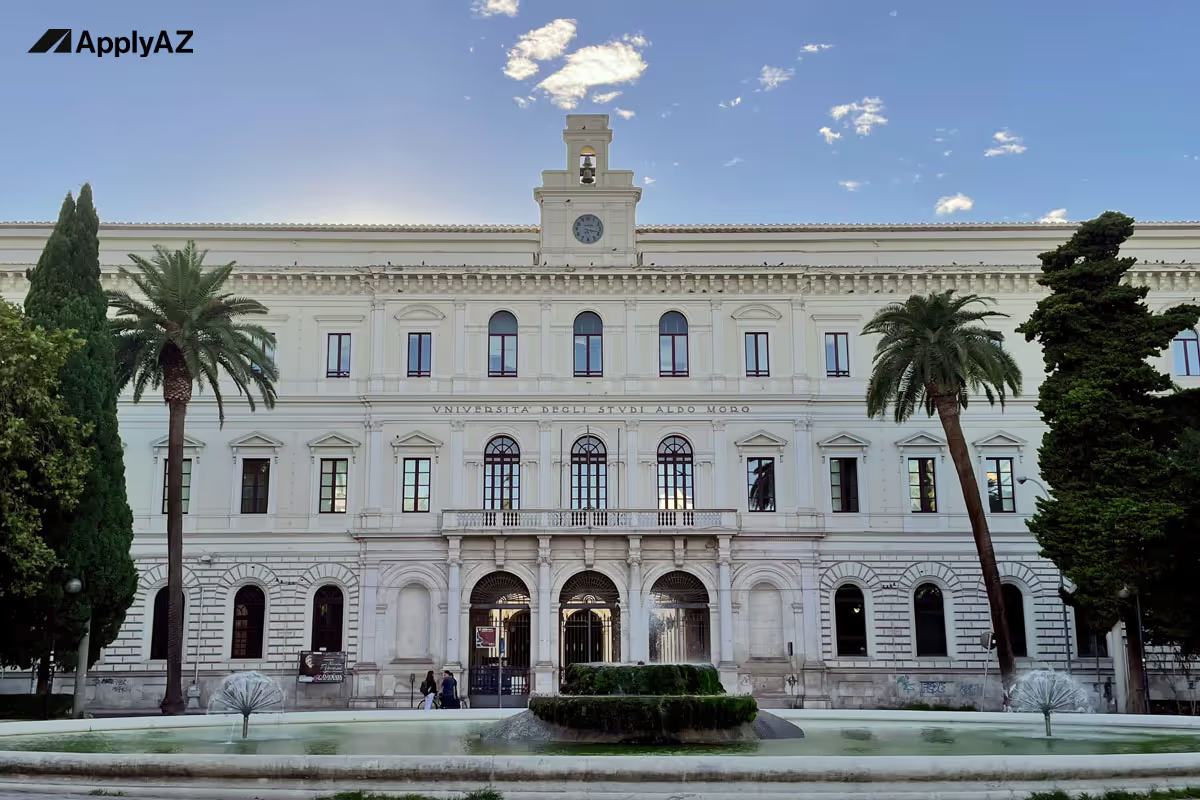Heading
Heading








University of Bari Aldo Moro
A research‑driven public university on the Adriatic
Founded in 1925, the University of Bari Aldo Moro is one of the largest public Italian universities. It hosts more than 50,000 students, 23 departments, and multiple research centres recognised across Europe. Times Higher Education places Bari within the world’s top 600 for physical sciences and life sciences, while national rankings praise its medicine and agritech clusters. For applicants seeking English‑taught programs in Italy, Bari now offers tracks in computer science, economics, biochemistry, and coastal engineering—all fully aligned with the European Credit Transfer and Accumulation System (ECTS). These degrees let you study in Italy in English while paying state‑controlled tuition that can be greatly reduced by the DSU grant and other scholarships for international students in Italy.
Key departments and strengths
- Medicine and Surgery – Clinical research partnerships with university hospitals fuel placements in oncology, cardiology, and regenerative medicine.
- Agricultural and Food Sciences – Mediterranean crop genetics, sustainable aquaculture, and food‑quality analytics.
- Computer Science and Artificial Intelligence – Labs on cybersecurity, machine learning, and quantum computing run joint projects with industry.
- Economics and Management – Courses in international trade and blue‑economy finance reflect Bari’s port connections.
- Earth and Environmental Sciences – Coastal erosion modelling and marine‑protected‑area management, ideal for climate‑focused students.
Faculty members lead EU Horizon projects, ensuring master’s and PhD students publish early and join global networks.
Bari: student city by the sea
Bari sits on the Adriatic coast of southern Italy, giving students year‑round access to waterfront promenades, fresh seafood, and ferry routes to Greece and Croatia. Living costs remain lower than in Rome or Milan. Shared flats near campus average €250–€300 per month, and a university canteen card delivers hot meals for a few euros. The Mediterranean climate offers mild winters (average 10 °C) and long summers cooled by sea breezes.
Public transport is student‑friendly. A single subscription covers buses, the metro‑style suburb rail, and night shuttles. Cyclists enjoy new bike lanes linking the old town to campus. Most lecture halls, libraries, and sports grounds sit within a compact radius, so you can swap books for beach gear in minutes.
Cultural life blends Apulian traditions with international events. Bari hosts Europe’s oldest sailing regatta, a rising film festival, and weekly language‑exchange evenings in the maze‑like Old City. Joining these activities polishes your Italian fast, yet academic life stays firmly in English.
Jobs, internships, and industry links
Regional economy at a glance
- Blue economy – Bari’s port supports shipping agencies, ship‑repair yards, and logistics tech startups.
- Agrifood cluster – Olive‑oil producers, dairy cooperatives, and vertical‑farm pilots seek data analysts, chemists, and marketers.
- Aerospace and defence – Multinationals maintain composite‑material plants and avionics labs on the industrial outskirts.
- ICT and cybersecurity – A government‑funded innovation hub hosts scale‑ups in fintech, cloud services, and AI.
The university’s Career Office posts over 1,500 internship offers yearly. Engineering students test wave‑energy converters along the coast; biotech majors map microbiomes in artisanal cheeses; economists draft feasibility studies for new ferry routes. Many roles accept English as the working language and count toward thesis credits. After graduation, alumni work across Italy, Europe, and the Middle East thanks to Bari’s transport links and the global recognition of Italian engineering and medical qualifications.
Funding your studies
International applicants benefit from layered support. The DSU grant, based on family income, can waive tuition, subsidise housing, and provide a stipend up to €7,000 a year. Merit awards offer further fee cuts for high GPAs or language certificates, while department fellowships pay research assistants to run coding labs or microscopy sessions. Combining DSU and merit funds often reduces net costs to figures rivaling tuition‑free universities Italy advertises, but with Mediterranean sunshine and modern lab access.
Why choose Bari and ApplyAZ
- Public‑university fees with generous scholarships for international students in Italy.
- Growing portfolio of English‑taught master’s degrees in tech, life sciences, and economics.
- Research impact proven by EU grants and high citation scores.
- Coastal city lifestyle with low living costs and multicultural vibe.
- Strong internship pipelines to blue‑economy, agrifood, and aerospace sectors.
- Easy domestic and international travel via airport, high‑speed rail, and ferries.
Your future classroom
Picture morning lectures on machine‑learning fairness, an afternoon lab sampling olive‑oil phenolics, and an evening stroll past Roman fortifications to watch the ferries depart. Faculty greet you by name, peers test your Italian idioms, and your supervisor urges you to submit that paper to an IEEE conference. This is daily life at University of Bari Aldo Moro.
In two minutes we’ll confirm whether you meet the basic entry rules for tuition-free, English-taught degrees in Italy. We’ll then quickly see if we still have space for you this month. If so, you’ll get a personalised offer. Accept it, and our experts hand-craft a shortlist of majors that fit your grades, goals, and career plans. Upload your documents once; we submit every university and scholarship application, line up multiple admission letters, and guide you through the visa process—backed by our admission-and-scholarship guarantee.
Computer Science (LM‑18) at University of Bari Aldo Moro
English‑taught Computer Science master’s—AI, cybersecurity, and cloud—at a public Italian university with DSU grant support and global research links.
Why this master’s stands out among English‑taught programs in Italy
Choosing a graduate tech degree means balancing content depth, research quality, and cost. This LM‑18 course lets you study in Italy in English while paying the regulated fees of public Italian universities. Tuition becomes lighter when you secure the DSU grant or other scholarships for international students in Italy, sometimes making the price as low as options offered by tuition‑free universities Italy promotes. The programme blends AI, cybersecurity, data engineering, and theoretical computing—preparing you for both industry and PhD tracks.
Programme overview: two years, 120 ECTS, full English delivery
All modules, labs, and assessments are conducted in clear English. Lecturers use short sentences and active voice, ideal for CEFR B2 learners. You will master algorithms, cloud infrastructures, machine learning, and formal methods, then apply them to real datasets through sprint projects and research internships.
Key features
- Small cohorts (~35 students) ensure personalised feedback.
- Access to GPU clusters and secure cyber‑ranges from semester one.
- Continuous assessment: quizzes, code reviews, and oral defences.
- Joint projects with EU Horizon consortia for publishable research.
Curriculum in detail
Year 1 – Foundations and essential tools
- Advanced Algorithms – Divide‑and‑conquer, graph paths, approximation schemes.
- Database Technologies – SQL optimisation, NoSQL design, ACID versus CAP trade‑offs.
- Software Engineering and DevOps – Agile metrics, CI/CD pipelines, container orchestration.
- Operating Systems and Virtualisation – Process scheduling, memory management, Linux namespaces.
- Statistical Methods for Data Science – Probability, regression, hypothesis testing, cross‑validation.
- Elective A – choose Cybersecurity Principles, Mobile Application Design, or Digital Signal Processing.
Year 2 – Specialisation and research
- Machine Learning and Deep Networks – Supervised, unsupervised, CNNs, fairness audits.
- Distributed and Cloud Computing – MapReduce, Kubernetes, serverless architectures.
- Elective B – options: Computer Vision, Blockchain Engineering, or Formal Verification.
- Research Internship – 450 hours (18 ECTS) in a lab or company; tasks feed the thesis.
- Master’s Thesis – 24 ECTS, original research often leading to conference papers.
All theory classes include weekly lab hours. You may, for example, deploy a microservice on Azure on Monday and prove its liveness property with model checking by Friday.
Learning approach: flipped classroom and sprint cycles
Professors release video capsules and reading packs before each session. Classroom hours then focus on problem solving, live coding, and peer critiques. Sprints last four weeks:
- Planning – define backlog items and deliverables.
- Execution – pair‑program using GitHub workflows.
- Review – present demos; classmates give structured feedback.
- Retrospective – identify blockers and refine tooling.
Short paragraph instructions keep cognitive load low, so you can absorb complex ideas quickly.
Research infrastructure and tech stack
- High‑Performance Computing cluster with 10 000 CPU cores and 200 GPUs.
- Cyber‑range for red‑team/blue‑team drills in an isolated network sandbox.
- Cloud credits via AWS Educate, Google Cloud, and Microsoft Azure.
- IoT lab with Raspberry Pi, Arduino, and edge‑AI accelerators.
- XR studio featuring VR headsets and motion‑tracking cameras for immersive‑tech prototypes.
Usage seminars run in the first fortnight, granting early access to all master’s students.
Internship: bridging lecture halls and industry floors
The mandatory 18‑credit internship immerses you in live projects:
- Training a fraud‑detection model for a fintech scale‑up.
- Developing a container‑based microservice diagram for a logistics provider.
- Hardening an enterprise network against zero‑day exploits in a cyber‑security lab.
- Optimising GPU kernels for an EU climate‑modelling centre.
Faculty and company mentors co‑design your learning plan, ensuring relevance and timely feedback.
Funding opportunities: DSU grant and beyond
DSU grant essentials
- Tuition waiver, meal vouchers, rent subsidy, up to €7 000 stipend per year.
- Open to EU and non‑EU applicants below defined income limits.
- Renewal requires 30 ECTS and satisfactory grades each academic year.
Additional scholarships for international students in Italy
- Merit fee reductions for high GPAs or GRE scores.
- Teaching assistantships (150 hours) in programming labs.
- Research contracts linked to EU Horizon or industry projects.
- Erasmus+ stipends for one‑semester mobility in Germany, Spain, or Finland.
Layering DSU and merit aid can reduce total expenses to almost zero, rivaling the budget of tuition‑free universities Italy highlights.
Career outcomes: numbers and pathways
A recent survey shows 94 % employment or PhD placement within six months. Typical roles include:
- Software engineer in cloud infrastructure teams.
- Data scientist creating recommender systems.
- Cyber‑security analyst performing penetration testing and incident response.
- AI engineer fine‑tuning vision models for autonomous drones.
- Doctoral researcher exploring quantum algorithms or ethical AI.
Employers praise graduates’ ability to explain code architecture in clear English—proof of the programme’s communication focus.
Admissions made simple
- Bachelor’s degree (180 ECTS) in computer science, engineering, mathematics, or related field.
- Core prerequisites: data structures, OOP, calculus, discrete maths.
- English proof: IELTS 6.5, TOEFL 90, or prior English‑medium degree.
- Motivation interview: online call covering technical readiness and career goals.
Support services and student life on campus
- Language Centre offers free Italian lessons for daily life.
- Counselling desk provides confidential help in multiple languages.
- Career Office hosts hackathons, start‑up pitch nights, and employer fairs.
- Peer mentors run coding clubs, game jams, and research reading groups.
These services ensure you progress academically, grow socially, and stay healthy.
Why this LM‑18 is a smart pick
- Full English instruction inside a renowned public university.
- Cutting‑edge labs open to master’s students from day one.
- Flexible electives spanning AI, security, and cloud.
- DSU grant and merit awards make study affordable.
- Strong job‑placement statistics across Europe and beyond.
- Supportive ecosystem—language classes, counselling, career coaching.
With these strengths, the Computer Science LM‑18 at University of Bari Aldo Moro ranks highly among English‑taught programs in Italy for ambitious tech talent.
Ready for this programme?
If you qualify and we still have a spot this month, we’ll reserve your place with ApplyAZ. Our team will tailor a set of best-fit majors—including this course—and handle every form and deadline for you. One upload, many applications, guaranteed offers, DSU grant support, and visa coaching: that’s the ApplyAZ promise. Start now and secure your spot before this month’s intake fills up.

They Began right where you are










